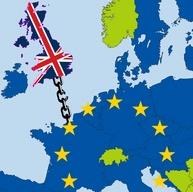(STRASBOURG) – An association agreement between the EU and the UK could provide an appropriate framework for their future relationship, the European Parliament said Wednesday taking into the UK government’s red lines.
This relationship would be based on four pillars, trade and economic relations (FTA), internal security, cooperation in foreign policy and defence and thematic cooperation, for example on cross-border research and innovation projects.
MEPs say the framework should include consistent governance, with a robust dispute resolution mechanism.
The resolution, prepared by the Parliament’s ‘Brexit Steering Group’, stresses the uniqueness of the EU ecosystem with its binding common rules, common institutions and common supervisory, enforcement and adjudicatory mechanisms. This means that even closely-aligned non-EU countries with identical legislation cannot enjoy similar rights, benefits or market access to those of EU member states.
Any framework for the future relationship would also need to respect the integrity of the internal market, customs union and four freedoms, without allowing for a sector-by-sector approach (cherry-picking EU laws). It should preserve the EU’s independent decision-making and legal order, including the role of the ECJ.
The EP resolution welcomes the European Commission’s 28 February draft of the Withdrawal agreement and expresses support for the transitional arrangements proposed.
It also reiterates the importance of securing equal and fair treatment for EU citizens living in the UK and British citizens living in the EU.
The resolution welcomes the European Commission’s draft protocol on Ireland and Northern Ireland including its backstop option outlined in the December Joint Report that provides a concrete fallback solution against any hardening of the border and preserves the North-South cooperation. MEPs also underline the importance of the British government ensuring there will be no diminution of the rights of citizens as set out in the Good Friday Agreement.
The resolution sets out Parliament’s input ahead of 22-23 March summit of EU heads of state or government, which is expected to approve the Council’s guidelines for negotiations on the UK’s future relationship with the EU. Any withdrawal agreement and future association or international agreement with the UK will need to win the approval of the European Parliament.
Further information, European Parliament



